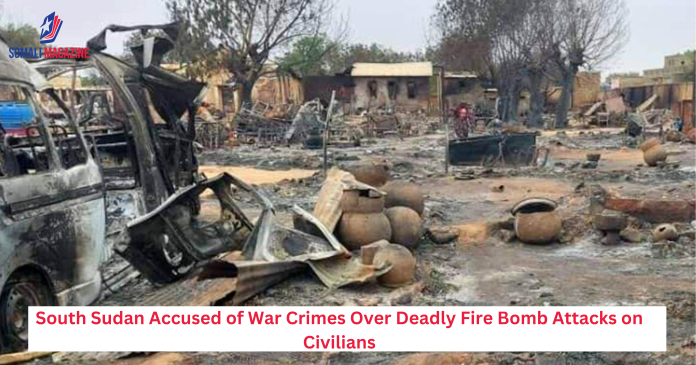Facebook Twitter (X) Instagram Somali Magazine - People's Magazine
Human Rights Watch says government airstrikes using improvised incendiary weapons have killed dozens, including children, and destroyed homes in Upper Nile state
NAIROBI, April 10, 2025 — Human Rights Watch (HRW) has raised serious concerns about South Sudan’s military using dangerous fire-based weapons in attacks that have killed dozens of people, including children, and destroyed homes and public infrastructure in Upper Nile state. HRW believes these attacks may be considered war crimes.
HRW says that between March 16 and late March, South Sudan’s army dropped homemade fire bombs—barrels filled with flammable substances—on civilian areas in Nasir, Longechuk, and Ulang counties. These attacks killed at least 58 people and left others with severe burns. Many victims were children, and survivors have been left with long-term injuries and trauma.
The United Nations peacekeeping mission in South Sudan (UNMISS) has been urged to set up temporary bases in the most at-risk areas to help protect civilians. HRW also called on the UN Security Council to pressure South Sudan to stop these illegal attacks and to deploy more peacekeepers urgently.
“These weapons are killing people and burning their communities,” said Nyagoah Tut Pur, a South Sudan researcher with HRW. “The government must stop using them, allow humanitarian aid through, and the UN must act quickly to protect the people.”
The violence escalated after two major incidents in early March: an attack by a group of armed Nuer youth known as the “White Army” on a government base and a separate attack on a UN helicopter that killed a UN crew member and over two dozen South Sudanese soldiers.
On March 17, South Sudan’s Information Minister confirmed the government had bombed areas believed to house White Army fighters. He implied civilians who stayed behind in those areas could also be targeted, which goes against international law. He also admitted Uganda is giving technical support to South Sudan’s army, something Uganda has confirmed.
However, Uganda denies taking part in any bombings or ground attacks. It also denied using chemical weapons or bombs meant to harm civilians.
Incendiary weapons—those meant to start fires—can cause terrible burns, long-term injuries, and mental trauma. They can also destroy homes, schools, and hospitals. Using them in crowded civilian areas breaks international law. Even though South Sudan hasn’t signed the treaty banning these weapons, their use shows the need for stronger global rules.
Witnesses from the March 16 attack in Longechuk county described large barrels falling from the sky and catching fire as they dropped. One woman said the ground shook and then the village was in flames. A family of four, including two children under ten, was found burned to death, along with two elderly women.
A health official confirmed at least 21 people died in that attack, including three who were being taken to Ethiopia for treatment. Medical workers said victims had serious burns that continued spreading after the attack—evidence that a harmful chemical may have been used.
In Nasir town, similar fire bombs were dropped on March 16 and 19, killing at least 22 people and burning many homes, including parts of a former UN site. In Kuich, Ulang county, another attack took place on March 21. Witnesses described a small plane dropping fiery barrels. Fires spread quickly, and 15 people, including 3 children, were killed. Another 17 were badly burned.
A local health center, a nutrition center, homes, and a market were destroyed. One security guard died from his burns. Fires were still burning days later, and many injured people were in critical condition as of March 30.
The situation is worsening as helicopter gunships continue attacking civilian areas. People are fleeing into Ethiopia, and aid groups are struggling to access affected communities due to ongoing violence and government restrictions.
South Sudan is under a UN arms embargo, which bans outside military support. HRW says Uganda’s involvement violates this ban. The UN Security Council is being urged to take action against Uganda and renew the embargo.
“As the government keeps using these horrifying tactics—dropping flaming barrels from the sky—it’s the people who suffer,” Pur said. “The world must act now to protect civilians and stop these attack.

